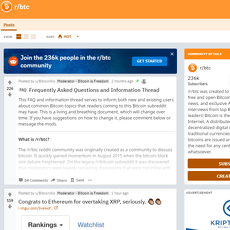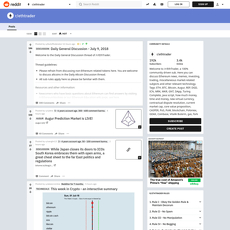r/CryptoTechnology Review
r/CryptoTechnology
www.reddit.com
r/CryptoTechnology Review Guide: How to Use Reddit’s Smartest Crypto Tech Hub (Without Getting Lost)
Have you ever opened Reddit, typed “crypto” into the search bar… and instantly regretted it?
You know the drill:
- Top posts are memes and low-effort jokes
- Random accounts screaming “this altcoin will 100x”
- Arguments that look more like sports fan rivalries than real discussion
And if you’re genuinely trying to understand how this stuff works under the hood, it feels like walking into a casino when what you really wanted was a classroom.
That’s exactly where r/CryptoTechnology comes in.
It’s one of the few corners of Reddit that actually focuses on the technology of cryptocurrencies and blockchains. Not “wen moon?”, not “which coin to buy?”, but questions like:
- What is a blockchain actually doing behind the scenes?
- Why does decentralization matter beyond marketing buzzwords?
- Is Bitcoin really safe if quantum computers keep getting better?
- How do privacy tools like zero-knowledge proofs even work?
If that’s the kind of thing you’ve been trying to figure out, this guide is going to feel like finally switching on a light in a messy room.
The problem: too much noise, not enough real crypto knowledge
Most crypto spaces on the internet are not built for people who want to understand how things work. They’re built to keep you excited, impatient, and clicking refresh on price charts.
Scroll through the average crypto subreddit or X (Twitter) feed and you’ll see:
- Endless “price prediction” posts with zero substance
- Influencers farming engagement with hot takes
- Shady projects pushing referral links or “airdrops”
- Tribal wars: “my chain vs your chain” instead of actual technical discussion
Now imagine you’re a beginner who just heard about Bitcoin or Ethereum and you start with a simple question like:
- “What is cryptocurrency?”
- “How does blockchain actually work?”
- “Is crypto safe or can it all be hacked?”
- “Is quantum computing going to kill Bitcoin?”
What usually happens?
You either get:
- A fluffy answer that sounds like it was copied from a marketing brochure
- A super technical comment full of acronyms that assumes you’ve studied cryptography for three years
- Or someone replying “just buy BTC and HODL” like that solves anything
There’s a name for this kind of environment: high noise, low signal.
Interestingly, this isn’t just a crypto problem. Studies on online learning communities show that when discussions are dominated by hype, inside jokes, and social games, people do learn less. They might spend more time on the platform, but they walk away with a weaker understanding of the core material.
In crypto, that’s dangerous. When you don’t understand what you’re dealing with, you’re more likely to:
- Fall for scams because you can’t tell legit projects from copy-paste forks
- Panic sell or FOMO buy driven purely by emotion
- Use insecure wallets, lose your keys, or trust random “yield” platforms
What’s missing in most places is a space where the main priority isn’t “number go up”, but “how does this system actually work and what are its trade-offs?”
That’s the gap r/CryptoTechnology tries to fill.
The promise: turning r/CryptoTechnology into your crypto tech “classroom”
Here’s the good news: if you know how to use it, r/CryptoTechnology can work like a free, constantly-updated classroom for crypto technology.
Not a lecture hall where someone talks at you for hours, but a place where:
- People who actually understand the tech hang out and explain things
- Good questions get thoughtful, nuanced answers
- New research papers and ideas are shared and broken down
- Hype gets filtered out early because the culture isn’t built around shilling
By the time you’re done with this guide, you’ll know exactly how to use the subreddit to:
- Understand the basics of crypto in plain language – what it is, why it exists, what problems it tries to solve
- Grasp how blockchains work at a practical level: blocks, nodes, consensus, fees, confirmations
- Explore advanced topics like quantum computing threats to Bitcoin or how privacy systems are designed
- Ask questions the right way so you get help instead of downvotes
Think of it as turning Reddit from a time sink into a custom crypto tech course, built around your curiosity instead of someone else’s marketing funnel.
For example, instead of Googling “is Bitcoin safe from quantum computing?” and getting a mix of sensational headlines and vague answers, you can check specific r/CryptoTechnology threads where people actually discuss:
- What kind of cryptography Bitcoin uses
- How strong that is against realistic quantum hardware
- What a transition to quantum-resistant algorithms could look like
This kind of grounded discussion is what makes the sub worth your time — once you know how to navigate it.
Who this guide is for (and who should skip it)
Before we go any further, let’s be clear: r/CryptoTechnology isn’t the right place for everyone — and that’s actually a good thing.
This guide is for you if:
- You’re a curious beginner who wants to understand the “why” and “how”, not just which coin might pump next week.
- You’re tech‑savvy or a developer and you want a place to read serious discussions about cryptography, consensus algorithms, scaling, and security.
- You’re an investor or researcher who wants to know what you’re actually backing — not just the ticker symbol.
- You’re tired of shallow takes and want to read or ask questions without being drowned in memes.
If any of this sounds like you, you’ll probably feel right at home in r/CryptoTechnology once you understand the flow.
On the other hand, this might not be for you (and that’s okay) if:
- You only want price predictions, moonshot calls, and “which coin should I buy today?” threads
- You mainly enjoy memes and tribal drama between different communities
- You’re not interested in how anything works under the hood and just want a signal to buy or sell
There are plenty of other subs built exactly for that. r/CryptoTechnology is something different: it’s the place you go when you’re done being purely a spectator and want to actually understand what you’re looking at.
Quick overview of what we’ll cover next
To keep things simple and practical, here’s how the rest of this guide is structured.
In the next sections, we’ll walk through:
- What r/CryptoTechnology actually is and how it compares to popular subs like r/CryptoCurrency
- How the subreddit helps you answer big beginner questions like “what is crypto?”, “what’s the point of it?” and “how does blockchain work?”
- Where to find high‑quality threads about advanced topics like quantum computing, security, and future threats
- How to use Reddit’s tools (sorting, search, filters) to turn the sub into your learning dashboard
- How to connect r/CryptoTechnology with curated resources so you get both community insight and solid educational material
- And a focused FAQ to clear up common questions before you start posting or lurking
The real goal here is simple: help you avoid the typical “Reddit overwhelm” and give you a clear way to use r/CryptoTechnology as a long-term advantage in your crypto journey.
So here’s the question for you:
What if, instead of guessing which voices to trust on Reddit, you knew exactly how to spot the subs, threads, and comments that actually deepen your understanding?
In the next part, we’re going to look straight at that: what r/CryptoTechnology really is, how it’s different from the usual crypto subs, and why its culture and rules are the secret sauce that keeps the signal high. Ready to see what makes this place special?
What is r/CryptoTechnology and what makes it different?
Open most crypto subs on Reddit and you’ll see the same pattern: screenshots of trading apps, “next 100x gem” threads, and low-effort memes that get more upvotes than a solid explanation of how a block header works.
r/CryptoTechnology is the exact opposite of that.
It’s a subreddit built around one thing: how the technology of cryptocurrencies and blockchains actually works – not which coin will moon next week.
If r/CryptoCurrency is the crowded casino floor, r/CryptoTechnology is the side room where the engineers, cryptographers, and quietly obsessed nerds sit around a whiteboard asking:
- “Is this consensus mechanism actually secure?”
- “What happens to this protocol if fees spike 10x?”
- “Can this privacy design really hide transaction graphs?”
That focus changes everything: the tone, the rules, the kind of posts that survive, and the way people talk to each other.
“In a market obsessed with price, the biggest edge is understanding.”
Let’s look at what that edge looks like inside this subreddit.
r/CryptoTechnology vs r/CryptoCurrency and other subs
Reddit is full of crypto communities, but they’re not interchangeable. Each sub has its own personality, blind spots, and use cases. Knowing the difference saves you months of frustration and misinformation.
Here’s how r/CryptoTechnology stacks up against the usual suspects:
r/CryptoTechnology – the tech-first hub
- Focus: technology, protocols, cryptography, security, design trade-offs
- Typical posts: “How does Ethereum’s proposer-builder separation work?”, “What are realistic attack vectors on Lightning Network?”, “Is this zk-SNARK construction sound?”
- Audience: curious beginners, engineers, security-minded investors, researchers
r/CryptoCurrency – the main street
- Focus: news, price, sentiment, memes, general chatter
- Typical posts: “This altcoin is going parabolic!”, “Market feels rigged today…”, “What’s everyone buying this week?”
- Culture: fast-moving, emotional, great for catching market mood, terrible for deep understanding
If you’re trying to learn why Bitcoin’s security budget matters or what “finality” actually means, r/CryptoCurrency will rarely give you what you need. You might catch a good comment once in a while, but you’ll scroll through a lot of noise to get there.
Single-coin subs: r/Bitcoin, r/Ethereum, r/Cardano, etc.
- Focus: each project’s ecosystem, news, dev updates, politics, occasional drama
- Strength: closer to the metal for that specific chain, often more up to date
- Weakness: tribal bias – criticism of the “home coin” can get emotional fast
Compare that with r/CryptoTechnology: here, you’ll see people calmly compare, for example, Bitcoin’s UTXO model vs Ethereum’s account model, or discuss whether some new DeFi protocol design breaks basic security assumptions – without needing to defend a bag.
Developer-heavy subs: r/cryptodevs, r/ethdev, protocol-specific dev subs
- Focus: code, implementation details, APIs, tooling
- Typical posts: “Why is my contract revert gas so high?”, “Help debugging this Rust node implementation”
- Barrier: if you’re not writing code, a lot of it will feel like reading another language
r/CryptoTechnology sits in a sweet spot:
- More technical and reality-based than r/CryptoCurrency
- Less tribal and emotionally charged than single-coin subs
- More accessible than dev-only spaces – you don’t need to be a programmer to follow the conversations
In that sense, it’s kind of like a public seminar room: you’ll hear PhD-level insight, but you can still raise your hand and ask, “Wait, what is a Merkle tree again?” without getting instantly mocked.
Types of posts you’ll usually see
If you scroll r/CryptoTechnology expecting memes and price predictions, you’ll think the sub is “quiet”. It’s not. The energy just goes into completely different things.
1. Deep explanations of protocols, consensus, privacy, and scaling
These are the posts where someone takes a tricky topic and breaks it down in a way that Reddit rarely does anywhere else. Think:
- “ELI5: What is a rollup and how is it different from a sidechain?”
- “How does Avalanche’s consensus actually achieve finality?”
- “Why do some chains use BFT-style consensus instead of Nakamoto consensus?”
You’ll often see top comments that turn into mini-articles: ASCII diagrams, step-by-step breakdowns of message flows, explanations of how a 51% attack would or wouldn’t work in a given system. These posts are gold for anyone trying to move from “buzzwords” to “understanding”.
2. Security, attack scenarios, and best practices
The sub has a strong security flavor. You’ll see threads like:
- “Is this wallet design safe against phishing and SIM swapping?”
- “Realistic attack vectors on a PoS chain with low stake participation?”
- “Can MEV be fully eliminated or only mitigated?”
A nice side effect: this isn’t just abstract theory. You’ll regularly see people link to real incidents – bridges getting hacked, protocols drained, wallets compromised – and then use those as case studies to talk through what went wrong.
That’s incredibly useful. Research from firms like Chainalysis and security orgs keeps showing the same thing: most crypto losses come from people not understanding risk, not from the tech magically “breaking”. Threads in r/CryptoTechnology often zero in on that gap.
3. Research papers, blog posts, and serious write-ups
Another common post type is someone sharing a new paper, CAD CAD model, or long-form blog and asking, “Does this actually hold up?”
- Links to academic papers on new signature schemes or consensus mechanisms
- Breakdowns of major updates like Bitcoin Taproot, Ethereum upgrades, or privacy protocol changes
- Summaries of talks from conferences like Real World Crypto or Devcon
Instead of a hype cycle, you get something closer to peer review. People ask:
- “What assumptions does this depend on?”
- “How does this compare to existing work?”
- “Could this design accidentally centralize power?”
For anyone who wants to stay informed without reading full whitepapers every weekend, these threads act like curated commentary.
4. Serious questions from beginners and semi-technical users
One of the most underappreciated parts of r/CryptoTechnology is how often you’ll see a well-asked “basic” question get thoughtful, patient answers:
- “How does a Bitcoin node verify a transaction without trusting anyone?”
- “Why do people say ‘not your keys, not your coins’ – what’s technically happening there?”
- “Is there any realistic way for a government to shut down a major public chain?”
When these questions are specific and show some effort, the community usually responds seriously. Some of the best explainers I’ve seen on key management, nodes, or mempools started as “I think I’m missing something – can someone correct me if I’m wrong?” style posts.
What you generally will NOT see:
- No shilling: posts like “Check out my new token – 100x potential!” are removed fast
- No price talk: “Will ETH be $10k?” or “Is it too late to buy X?” belongs elsewhere
- No pure memes: memes might appear in comments sometimes, but they’re not the main content
- No copy-paste spam: low-effort “articles” or AI content with no context usually gets buried
The community has collectively decided that attention is scarce and should be spent on “How does this work?” and “Is this safe?” long before “How do I get rich off this?”.
Who moderates it and what the rules look like
A subreddit lives or dies by its moderation. You can have the smartest people on earth subscribed, but if every thoughtful post gets buried under spam, the sub is useless.
r/CryptoTechnology has a pretty strict but sensible rule set, and you’ll feel it as soon as you compare it with a hype-driven sub.
Core rules you’ll notice in practice:
- No price, no trading advice. Posts asking “What should I buy?” or “Is now a good time to sell?” usually get removed. That instantly filters out a huge chunk of low-value content.
- Tech focus only. If your post doesn’t touch on design, security, implementation, real-world usage constraints, or long-term implications of the tech, it probably doesn’t belong.
- No low-effort or sensational titles. Clickbait like “This will DESTROY Bitcoin!” usually gets shut down. Mods and users expect neutral, descriptive titles.
- No obvious shilling or referral spam. If a link is clearly marketing dressed up as “education” – especially with referral codes or invite links – it’s often reported and removed.
This isn’t about being elitist. It’s about protecting the signal. There’s actually some behavioral research that backs this approach: communities that enforce clear topic boundaries and norms tend to keep higher-quality discussion and retain serious contributors longer. You can see this pattern in tech mailing lists, old-school forums, and well-run Discords – r/CryptoTechnology follows that playbook on Reddit.
How that affects you as a reader or poster:
- You spend less time guessing whether a post exists to educate or to pump someone’s bags.
- You can scroll “New” and still find long-form, thoughtful content, instead of wall-to-wall gifs.
- If you ask a genuine tech question, there’s a good chance it won’t be drowned by “just buy the dip” comments.
From what I’ve seen, the mod team and regulars lean heavily towards a simple rule-of-thumb: if it makes people think about how the system works, it belongs; if it only makes people speculate about price, it doesn’t.
That might sound strict, but it’s exactly why the subreddit has become a quiet go-to spot for builders, long-term users, and investors who actually want to understand what they’re holding.
And here’s where things get really interesting: once you know what kind of posts live in r/CryptoTechnology, you can start using it like a personal tutor for those “big beginner questions” that Google keeps giving shallow answers to.
Wondering what a total beginner should really know, beyond “buy low, sell high”? Or what the point of crypto is when you strip away the hype? Or how to finally make sense of blockchain without getting lost in jargon?
That’s exactly what we’re going to look at next.
Using r/CryptoTechnology to answer beginner questions about crypto
If you’re like most people, you didn’t come into crypto asking about Merkle trees or zk-SNARKs.
You probably started with something much simpler (and more honest):
- “What should a beginner know about cryptocurrency?”
- “What’s the point of this stuff beyond getting rich?”
- “Can someone explain blockchain in normal human language?”
The problem is that when you type those into Google, you usually land on:
- Exchange marketing pages that quietly push you to “Get started now”
- Beginner guides written by SEO agencies that don’t actually use crypto
- Or Reddit threads that are 90% memes and 10% people arguing about which coin is a scam
r/CryptoTechnology is one of the rare places where these beginner questions are treated as serious, technical questions – not an excuse to shill a token.
When you know how to use it, the subreddit becomes a kind of interactive glossary and Q&A board for the fundamentals. Let’s walk through how it helps with the three big questions almost everyone has at the start.
“What should a beginner know about cryptocurrency?”
A lot of beginner guides talk around crypto. r/CryptoTechnology talks about what it actually is.
Here’s the kind of foundation the sub helps you build, piece by piece.
1. What a cryptocurrency actually is (vs just “internet money”)
Forget the buzzwords for a second. In r/CryptoTechnology, you’ll see explanations framed more like this:
- A cryptocurrency is a digital asset that lives on a shared database (a blockchain) that anyone can verify.
- There’s no central company or bank that updates the ledger – the network of nodes does that through a protocol.
- Ownership is controlled by cryptographic keys, not usernames and passwords.
Instead of “crypto is like Venmo but on the blockchain”, you’ll bump into comments that unpack what a ledger is, how transactions are ordered, and why immutability matters. That’s the stuff the marketing pages skip.
One recurring theme you’ll notice in threads is the contrast with traditional money:
- Bank balances: editable by a central party, reversible, censorable.
- Crypto balances: globally visible, hard to reverse, difficult to censor if the network is healthy.
People often use real-world stories: for example, a user explaining how a payment processor froze funds for “fraud checks” vs how a Bitcoin transfer works with no one to approve or deny it.
2. Coins vs tokens (and why the difference matters)
Beginner blogs often throw “coin” and “token” around like they’re the same. On r/CryptoTechnology, you’ll find explanations that regularly circle back to this distinction:
- Coins: native assets of a blockchain (BTC on Bitcoin, ETH on Ethereum). They pay for block space and security.
- Tokens: assets built on top of an existing chain (like ERC-20 tokens on Ethereum) that use someone else’s security and infrastructure.
Why does this matter? Because it touches everything:
- Security assumptions – a token inherits the base chain’s security, a coin anchors it.
- Fee mechanics – sending a token still needs the base coin for gas.
- Regulation and risk – many “tokens” are closer to startup equity than money.
In one thread I remember, a user asked, “Why is gas paid in ETH if I’m just moving an ERC-20 token?” The top comment broke it down like rent: ETH is the rent you pay to use Ethereum’s global computer, while your token is just an app running on that computer. That kind of analogy sticks far better than textbook definitions.
3. Why decentralization is such a big deal (and not just a slogan)
If you read something like NerdWallet’s crypto intro, you’ll get a decent surface-level explanation of what Bitcoin is. What you often don’t get is why people fight to keep it decentralized.
In r/CryptoTechnology, decentralization shows up in almost every serious thread:
- Censorship resistance: can anyone stop your transaction from being included?
- Permissionless access: can anyone run a node or build on the network without approval?
- Open verification: can anyone independently verify the rules are being followed?
You’ll see this play out in real arguments: discussions about whether L2s are too centralized, debates over validator sets, and deep dives into how many people actually run full nodes for a given chain.
“Decentralization isn’t a feature you slap on the marketing page. It’s a cost you’re willing to pay for not having to ask permission.”
That kind of line doesn’t come from a PR team. It comes from people who’ve spent years watching what happens when projects quietly trade decentralization for convenience – and paying the price later.
“What is the point of crypto?” – beyond price and speculation
If you ask “What’s the point of crypto?” in a bull market on a trading sub, you’ll get 50 comments saying “Number go up”.
Ask the same question on r/CryptoTechnology, and the answers tend to look very different.
1. Money as a tool, not a ticker symbol
People often talk about crypto in context:
- As a medium of exchange – “I pay remote contributors in USDT because our local bank fees are insane.”
- As a store of value – “My country had 50%+ inflation; holding BTC/USDT was less risky than holding cash.”
- As an escape valve for capital controls – “We used stablecoins when our bank limited withdrawals.”
This echoes some of the themes you see on educational pages like Coinbase Learn, but the difference is that Reddit users also talk about when it fails:
- Someone trying to use Bitcoin for everyday coffee payments and running into fees and UX issues.
- People stuck in DeFi hacks because they chased yield without understanding smart contract risk.
- Users burned by centralized exchanges that locked withdrawals “temporarily”.
Those stories are painful but honest, and they frame the “point of crypto” in a much more realistic way.
2. Utility tokens, and what “utility” actually means
Marketing loves to call everything a “utility token”. On r/CryptoTechnology, that word gets challenged a lot.
You’ll see questions like:
- “Does this token actually do something, or is it just an excuse to raise money?”
- “Could this protocol work with fees paid in the base coin instead?”
- “Is this token necessary, or just a way to route value to insiders?”
Users often break down real examples:
- Tokens that give access to storage, bandwidth, or computation – where using the token is tied directly to a service.
- Tokens that only exist to offer “staking rewards” without any real underlying business – which the community tends to call out quickly.
One thing I really like: when someone posts a flashy new “utility token”, the top comment is often a sober checklist: What problem does it solve? Why does it need a token? What are the trade-offs against just using ETH, BTC, or a stablecoin?
3. Real use-cases: remittances, censorship resistance, open finance
The most convincing answers to “What’s the point?” are usually specific and boring – not dramatic.
Here are some recurring themes in the subreddit:
- Remittances: People sending money across borders using stablecoins to avoid insane remittance fees or corrupt intermediaries.
- Censorship resistance: Stories of activists, journalists, or NGOs that used Bitcoin or stablecoins after traditional banking cut them off.
- Open finance: Protocols that let anyone with an internet connection lend, borrow, or trade – but with constant reminders in the comments about smart contract risk and protocol failures.
- Tokenized assets: Real-world assets (like treasury bills or bonds) wrapped into tokens, then scrutinized by users asking hard questions about custody and legal structure.
There’s an interesting pattern here that lines up with some academic work: in studies of Bitcoin adoption in emerging markets, researchers found that usage spikes more in places with capital controls and inflation than in rich countries with stable currencies. Threads on r/CryptoTechnology often echo this; you’ll see users from those regions describing crypto less as a speculative toy and more as a blunt survival tool.
The end result: you don’t just walk away with “Crypto is the future”. You walk away with something closer to: “Crypto is useful here, here, and here. It fails there and there. And the tech choices decide which is which.”
“How to understand blockchain for beginners?”
“Explain blockchain like I’m 5” is one of the most common asks in the sub, and honestly, some of the best answers I’ve seen on the entire internet live in those threads.
Here’s how to get the most out of them.
1. Look for simple breakdowns of the core pieces
When you search inside the subreddit (I’ll talk about searches more later), try terms like:
- “ELI5 blockchain”
- “beginner: blockchain basics”
- “how mempools work”
- “ELI5 consensus”
You’ll usually find comments that break things down into the big components:
- Blocks: batches of transactions grouped together and added to the chain.
- Nodes: computers that keep copies of the blockchain and check that rules are followed.
- Miners / validators: the ones who propose new blocks and get rewards for securing the network.
- Consensus: the method nodes use to agree on which block is the “real” next block.
Instead of reading one long explainer like CoinGeek’s “how blockchain works”, you get dozens of small explanations, metaphors, and clarifications – and you can ask follow-up questions when something doesn’t click.
2. Walk through a transaction from wallet to confirmation
One of my favorite use-cases for the subreddit: searching for “how does a bitcoin transaction get confirmed” or “step by step transaction”.
In a good thread, someone usually walks through the process like this:
- You create a transaction in your wallet, specifying inputs (what you’re spending) and outputs (who gets what).
- Your wallet signs it with your private key and broadcasts it to the network.
- Nodes receive it and put it in the mempool (a waiting room for valid but unconfirmed transactions).
- Miners pick transactions from the mempool (often prioritizing higher fees), put them in a block, and try to produce a valid block.
- Once a miner succeeds, other nodes verify the block. If it follows the rules, they accept it and build on top of it.
- Each new block added after that is another confirmation, making it harder to rewrite history.
If anything in that chain feels fuzzy, you can reply directly and ask, “Wait, where does the mempool live?” or “What happens if two blocks are found at the same time?” – and usually someone will come back with a concrete answer or a diagram.
3. Use analogies and visuals people share
Not everyone thinks in code or math. The nice thing about a community is that someone will usually explain things in a way your brain likes.
Some analogies I’ve seen work well:
- Blocks as pages in a public accounting book; each new page references the previous one.
- The mempool as a waiting room where transactions sit until a miner “calls their name”.
- Consensus as a voting system where the “longest valid chain” wins, not because of popularity, but because it reflects the most work or stake.
People often link to diagrams, GIFs, or interactive tools too. You might see someone share an open-source block explorer, a visual mempool tracker, or a site that simulates how blocks get added over time.
It’s like getting ten versions of the same concept until one suddenly clicks for you.
How to ask a beginner question without getting roasted
Being new is not the problem. Being lazy is.
In r/CryptoTechnology, people actually like helping beginners who show that they’re trying. If you don’t want to get ignored or downvoted, here’s what works.
1. Read the sidebar and search first
Before posting, do two quick things:
- Skim the subreddit rules (they’re usually in the sidebar or pinned). You’ll see “no price talk”, “no shilling”, that kind of thing.
- Use the search bar with a couple of your keywords. Try combinations like “ELI5 + your question” or “beginner + topic”.
If you find a thread that’s 80% of what you need, read it and then ask a focused follow-up. That shows you’re not asking people to retype the entire internet for you.
2. Say what you already know (even if it’s wrong)
One of the easiest ways to get good answers is to include your current understanding in the question:
- “My current understanding is X – is that right, and what am I missing?”
- “I get that miners create blocks, but I don’t understand how they agree which chain to follow.”
- “I know private keys control access, but where does my wallet actually store them?”
This gives responders something to correct and build on. It also makes your question different from the 1,000 vague “How does crypto work?” posts.
3. Be specific, not “teach me everything”
Vague questions get vague answers. Try to focus on one concept at a time:
- Instead of: “How do blockchains work?”
- Ask: “What stops someone from changing old blocks in Bitcoin?”
- Instead of: “Explain Ethereum to me?”
- Ask: “Why does Ethereum need gas fees, and where do they go?”
Specific questions tend to attract users who have just explained that exact thing to a friend or coworker and can share a battle-tested explanation.
4. Take corrections as a win, not an attack
Crypto can be intimidating because the words are unfamiliar and the stakes feel high. But here’s the mindset that works best in a subreddit like this:
“Every time someone corrects me, my understanding gets a little more antifragile.”
If someone says, “Actually, that’s not quite right – here’s why…”, and backs it up with sources, that’s a gift. You’re getting a free peer review.
The people you see growing fastest in r/CryptoTechnology are usually the ones who ask, “Okay, that makes sense. Do you have a link where I can read more about this?” instead of arguing for the sake of being right.
And when you handle your first “dumb” question well, something interesting happens: you start recognizing other beginners making the same mistake you once did. That’s when you can jump in and help them – and teaching is one of the best ways to make your own understanding stick.
So if r/CryptoTechnology is where you get the basics straight – what crypto is, why it exists, and how blockchains actually process your transactions – what happens when you’re ready to tackle the scarier questions?
Questions like: “Could quantum computers really break Bitcoin?” or “How safe is this cryptography in 20 years?”
That’s where things get really interesting… and that’s exactly what comes next.
Big brain stuff: quantum computing, security, and future threats
Once you get past the “what is crypto?” phase, the questions get a lot sharper:
“Can quantum computers kill Bitcoin?” “Are my coins really safe long term?” “What happens if today’s cryptography becomes useless?”
This is where r/CryptoTechnology quietly shines. While most subs are arguing about the next meme coin, you’ll see people here breaking down papers from top cryptographers, pointing out real failure modes, and arguing (politely… mostly) about what’s actually realistic.
Think of it as the part of Reddit where people worry about things 10–20 years before they hit the news.
“Is quantum computing a threat to Bitcoin?” – how the sub talks about it
If you search that exact question inside r/CryptoTechnology, you’ll usually see a very familiar pattern:
- Someone asks if “one quantum computer” can just log on one day and crack everyone’s wallet.
- A bunch of comments argue “it’s overblown” vs “it’s a ticking time bomb”.
- Then a few very patient people show up with actual numbers, research links, and trade‑offs.
The worry itself is simple: Bitcoin (and basically every major blockchain) relies on cryptographic assumptions that could be broken by a powerful enough quantum computer. In particular:
- Elliptic Curve Digital Signature Algorithm (ECDSA) – used to prove you own a Bitcoin address.
- SHA‑256 – used for mining and addresses (quantum affects this differently).
The fear is that a quantum computer running algorithms like Shor’s could recover private keys from public keys, or at least make brute‑forcing much easier.
Here’s how the better r/CryptoTechnology threads usually unpack this:
1. Today’s quantum computers are nowhere near strong enough
You’ll often see comments referencing estimates like:
- Breaking a single 256‑bit ECDSA key would likely need on the order of millions of stable, error‑corrected qubits.
- A 2022 review by the US National Academies and various academic papers suggest we’re still in the “toy” era – think dozens to low hundreds of noisy qubits, not millions of stable ones.
So when people in r/CryptoTechnology say “not yet a practical threat,” they’re not hand‑waving – they’re pointing to the actual engineering reality: error correction, decoherence, cooling, insane power requirements.
One comment I remember summed it up nicely:
“If you’re worried about a quantum computer stealing your BTC next year, you’re panicking way too early. If you’re not thinking at all about how Bitcoin would migrate in 20 years, you’re probably too relaxed.”
That’s the vibe of the sub: not fear‑mongering, not “nothing to see here” – just sober long‑term thinking.
2. Public keys aren’t always exposed (and that matters)
Another nuance that gets explained well there: on Bitcoin, your full public key is only revealed when you spend from an address.
- Before you spend, people usually only see the hash of your public key.
- That adds an extra layer a quantum attacker has to get past.
So you’ll see advice like:
- Don’t reuse addresses.
- Keep long‑term cold storage in addresses that have never been spent from.
These aren’t magic shields, but they buy time and reduce the attack surface. The better comments in r/CryptoTechnology walk beginners through this step by step, often with simple diagrams or “imagine your public key is your house number vs a PO box” analogies.
3. Bitcoin can upgrade – it’s not frozen in stone
Another recurring theme: even though Bitcoin is conservative, it’s not technically stuck with today’s cryptography forever.
In the higher‑quality threads, people usually break it down like this:
- Crypto‑agility – the ability of a protocol to swap its cryptographic primitives (like ECDSA) for new ones.
- Post‑quantum algorithms – like lattice‑based schemes (CRYSTALS‑Dilithium, Falcon, etc.), some of which are being standardized by NIST right now.
- Migration paths – soft forks that introduce quantum‑safe address types, opt‑in upgrades where users move coins to new scripts, etc.
One thread I saw linked to academic work on “quantum‑safe blockchain migrations” and then broke it down in plain language: how you could introduce new opcodes, how wallets would guide users through moving funds, what happens to lazy users who never move their coins, and how miners would enforce new rules.
That’s exactly the kind of thing you almost never see on hype‑heavy subs – a mix of research papers and “ok but how would this actually work in practice?”
4. The real risk might be the transition period, not “one big hack”
Another angle r/CryptoTechnology loves to talk about: the social and economic mess during a quantum transition.
- What if nation‑states have powerful quantum machines but keep them secret?
- What if an attacker quietly targets old reused addresses with large balances?
- How do you coordinate a migration when the user base is global, distracted, and half of them ignore warnings?
People often compare it to the early TLS / SSL days on the web – the ciphers didn’t all break at once, but over time the bar for “acceptable security” moved up. Some sites adapted, others lagged and got burned.
So the discussions in r/CryptoTechnology aren’t just about math. They’re about incentives, governance, wallet UX, and how messy humans are.
And that’s the point: if you want to really understand a question like “Is quantum computing a threat to Bitcoin?”, you need both the equations and the human side. That’s what the best threads there give you.
Other advanced topics you’ll see
Quantum is just one example. Scroll a bit and you’ll see the sub constantly circling around a few big “frontier” areas.
Zero‑knowledge proofs and privacy
You’ll see posts unpacking things like zk‑SNARKs, zk‑STARKs, and bulletproofs. But instead of just repeating buzzwords, people ask real questions:
- What trust assumptions does this zk system make?
- Is there a toxic setup that could let someone create unlimited coins?
- How heavy is the proof verification for regular nodes?
For example, someone might link a paper about a new zk scheme and the top comments will be:
- A cryptographer pointing out which assumptions are new and untested.
- A developer explaining what it would cost to run this on a consumer laptop.
- A privacy advocate asking if this leaks metadata on chain timing or amounts.
It’s like a mini peer‑review session, in public.
Scaling: rollups, sharding, sidechains, L2s
On most subs, “scaling” gets reduced to “this chain is faster, buy it”. On r/CryptoTechnology, people split that into very specific questions:
- Is this a rollup (data on L1, proofs on L1) or a classic sidechain where you trust a separate validator set?
- How does this rollup handle data availability – can users reconstruct the state if something goes wrong?
- What’s the exit game if the L2 operator goes malicious or disappears?
There are frequent breakdowns of Ethereum rollups, Bitcoin sidechains, and newer designs like validity rollups for other ecosystems. People share diagrams, explain what “fraud proofs” vs “validity proofs” mean, and argue about the right trade‑offs between decentralization, speed, and complexity.
New consensus mechanisms and their trade‑offs
Every few months, a new project pops up claiming a “revolutionary” consensus mechanism. On r/CryptoTechnology, the community usually attacks that claim in a pretty healthy way:
- Is this actually new, or just a variation of something like PBFT, HotStuff, or Nakamoto consensus?
- What’s the liveness vs safety trade‑off?
- What assumptions does it make about network synchrony and honest majority?
People often link to the original whitepaper, then to critiques, then to real‑world incidents where a similar design failed under stress. You’ll see Byzantine faults, long‑range attacks, reorg depth, and incentive misalignment all discussed in one thread.
Wallet security, hardware wallets, and key management
This is where the theoretical gets uncomfortably practical.
Typical posts:
- “Is this hardware wallet actually secure or just well‑marketed?”
- “What’s the safest way to back up a seed phrase?”
- “Can malware steal my coins even with a hardware wallet?”
And the answers are rarely “just buy X.” Instead, you’ll see:
- Discussions of secure element chips, open‑source firmware, and supply chain risks.
- Breakdowns of real research – like papers showing side‑channel attacks on specific devices.
- Practical advice on using passphrases, multisig, air‑gapped machines, and what’s realistic for a normal person vs an institution.
One of the recurring emotional themes here is sobering but important:
“Most people don’t lose coins because of cutting‑edge zero‑days. They lose them because of bad backups, phishing emails, and typing their seed into a random website.”
That hits hard, but it’s true. And those are the kinds of reminders you’ll see in r/CryptoTechnology when someone posts “I just lost everything, what did I do wrong?”
How to follow expert discussions without a PhD
Now, let’s be honest: some threads in r/CryptoTechnology can look like alphabet soup if you’re not deep in the field yet.
The good news is you don’t need to understand everything to start getting value. You just need a smart way to read.
1. Let the sorting do some of the work
When you open a big technical thread:
- Sort comments by “Top” to see the explanations that resonated with the most people.
- Try “Best” if Reddit gives you that option – it often surfaces comments that are both highly upvoted and recent.
- Switch to “Controversial” if you want to see both sides of a debate and understand where the disagreements are.
This alone makes heavy threads way more approachable. Instead of reading 200 low‑effort comments, you get the best 10–20 first.
2. Ask for simpler explanations (people actually respond)
One of the underrated moves: reply to a high‑level comment with something like:
- “This is interesting but I’m new – can you explain this part like I’m 15?”
- “What does ‘data availability’ mean here in plain English?”
In r/CryptoTechnology, this usually works. A lot of the regulars actually enjoy explaining hard things in simple ways. Sometimes someone will write a full mini‑guide just off that one request.
And the best part? You’re not just helping yourself – you’re helping every other lurker who had the same question but was too shy to ask.
3. Build your own tiny glossary as you read
When a new term pops up – like “fault tolerance”, “circuit privacy”, or “UTXO set” – don’t try to memorize the whole field in one night. Just:
- Write the term down in a note app or notebook.
- Next to it, add a one‑sentence explanation in your own words.
- Update that sentence as your understanding improves.
After a few weeks of reading r/CryptoTechnology this way, you end up with a personal cheat sheet tailored to your actual questions, not some generic textbook.
4. Use links as a “difficulty slider”
Pay attention to the kinds of links people drop in comment threads:
- If they link a blog post or explainer, that’s usually “entry level” for the topic.
- If they link the original whitepaper or academic paper, that’s the “hard mode” version.
- If they link a GitHub repo, that’s “ok, let’s see how this actually works in code.”
You don’t have to read everything. Just pick the level that feels challenging but not crushing right now, and keep the harder stuff bookmarked for later.
5. Remember: confusion is a signal you’re on the frontier
There’s a quiet emotional side to all of this. When you’re scrolling through a thread full of cryptography terms and you understand maybe 30%, it’s easy to feel like you’re “not smart enough” for the tech.
That’s usually a lie your brain tells to keep you comfortable.
In reality, the fact that you’re even reading about post‑quantum migration paths, zk‑proof systems, and consensus failures already puts you ahead of 99% of “crypto investors” who never go beyond price charts.
I like to think of it this way:
“If a topic feels confusing but interesting, that’s exactly where your edge is being built.”
r/CryptoTechnology is one of the rare places that feeds that curiosity instead of drowning it in noise.
And here’s the fun part: once you start getting answers to these big security and future‑threat questions, the next step is figuring out how to make this sub part of your regular learning routine instead of just a random scroll.
So how do you actually set up Reddit to give you signal instead of noise, and turn r/CryptoTechnology into a daily habit that quietly compounds your understanding?
That’s exactly what I’m going to unpack next…
How to actually use r/CryptoTechnology: setup, filters, and habits
If you treat r/CryptoTechnology like just another feed to scroll, you’ll get random insights mixed with distraction.
If you treat it like a tool, you can turn it into a daily, high-signal learning machine.
Let me show you how I do that in a way you can copy, tweak, and make your own.
Setting up Reddit for signal, not noise
First step: fix the environment. The platform is the filter. If your Reddit is full of moon posts and meme coins, your brain will be too.
Here’s a simple setup that works whether you’re on desktop or mobile.
- Subscribe to the right subs
Obviously, start with r/CryptoTechnology, but don’t stop there. Add a small “tech pack” of subs so your recommendations lean toward real knowledge:
- r/Bitcoin (for protocol and network discussions)
- r/ethereum (research, EIPs, rollups)
- r/cryptodevs (heavier on code and implementation)
- r/cryptography (for the math behind the magic)
Even if you’re not a dev, just having these in your mix nudges your brain to think in terms of systems, trade-offs, and security instead of short-term price moves.
- Mute the stuff that pulls you back to noise
If you’re honest, you already know which subs waste your time. A lot of people bounce between:
- r/CryptoCurrency (heavy on price, drama, and news)
- shill-heavy token subs
- “signals” and “calls” communities
On Reddit’s app and website, you can leave or mute subs so they don’t show up in Home. Do that ruthlessly for anything that makes you want to FOMO instead of learn.
A small trick that works surprisingly well: for a week, use only the “r/CryptoTechnology” feed and ignore “Home”. It forces your brain into learning mode.
- Use the interface that makes you read, not skim
A lot of people who like longer, thoughtful posts swear by old Reddit. It’s cleaner, less animated, and better for long comment chains.
If you’re on desktop and want power tools, check out Reddit Enhancement Suite (RES). It lets you:
- Filter posts by keywords (“price”, “pump”, “moon” – straight to the bin)
- Highlight usernames you trust, so their comments stand out
- Quickly save or tag threads for your own reference
Think of it as custom noise-cancelling for Reddit. If you reduce friction, you’ll actually read the smart stuff you subscribe to.
“You are the average of the information you consume every day. Choose your inputs like your future depends on them, because it does.”
Smart ways to search inside the subreddit
r/CryptoTechnology has already answered a huge percentage of the questions you’re going to have. The trick isn’t asking better questions. It’s finding the existing, high-signal answers.
Reddit’s built-in search is decent, but combining it with Google works even better.
- Use Google as your front door
In your browser search bar, try patterns like:
site:reddit.com/r/CryptoTechnology beginner wallet securitysite:reddit.com/r/CryptoTechnology ELI5 consensus mechanismsite:reddit.com/r/CryptoTechnology hardware wallet seed phrase backupsite:reddit.com/r/CryptoTechnology "quantum" Bitcoin threat
Google will surface the most linked-to and engaged threads first, which usually means better explanations and more review from the community.
- Use “learning” keywords in the sub’s own search
Inside r/CryptoTechnology, use the search bar with intent, not random guesses. Some keyword combos that often surface gold:
- “ELI5” – Explain Like I’m 5 (beginner-friendly breakdowns)
- “for beginners” or “overview” – good for broader concepts
- “vs” – e.g., “proof of work vs proof of stake security”
- “tradeoffs” – people usually discuss pros and cons honestly
- protocol name + “security” or “attack” – e.g., “Lightning Network attack”, “zk rollup data availability”
When you see a thread with a very generic title like “Help me understand X”, always check the comments. Sometimes a boring title hides a nuclear-level explanation from a protocol dev or security researcher.
- Sort posts and comments the right way
Once you open a search result, the sorting makes a huge difference:
- Sort posts by “Top” (Last Year or All Time) when you want evergreen explanations.
- Sort by “New” when you’re following bleeding-edge tech like new L2s or upgrades.
- Sort comments by “Top” first to get the clearest answers, then
- Switch to “Controversial” if you want to see where experts disagree (great for learning trade-offs).
This might sound small, but based on attention studies around social feeds, your brain is heavily biased by what it sees first. Sorting correctly makes sure the first thing you read is actually worth wiring into your memory.
Building a learning routine with the sub
You don’t need to read Reddit for three hours a day to get ahead. In fact, that usually backfires and turns into scrolling.
A better approach is a short, focused routine that you repeat until it becomes automatic.
- 10–15 minutes a day, max
Pick a time where your brain is relatively fresh – mornings work well for most people – and commit to:
- Open Top posts (This Week)
- Pick one or two threads that match your current level and interests
- Actually read the top comment chain, not just the OP
Even a short, consistent habit like this compounds. After a few weeks, you’ll notice you understand terms that used to confuse you: UTXOs, MEV, rollups, Schnorr signatures, etc.
- Create your own “crypto tech notebook”
Don’t rely on memory alone. Studies on spaced repetition and note-taking show that writing things down dramatically improves retention.
Here’s a low-friction setup:
- Use a notes app (Notion, Obsidian, Google Docs – whatever you like)
- Create sections like: Consensus, Wallets & Security, Scaling, Privacy
- When you read a great explanation on r/CryptoTechnology:
- Paste the key quote
- Add the link to the thread
- Write your own one-sentence summary underneath
That last step – putting it in your own words – is what really cements understanding.
- Use Reddit’s built-in “Save” and custom tags
On each post or comment, there’s a Save option. Use it aggressively for:
- Security checklists (hardware wallets, multisig setups, backup strategies)
- Deep explanations of concepts you’re still wrapping your head around
- Nuanced debates (e.g., “PoW vs PoS long-term security”)
If you’re using RES or a notes app, you can tag saved links with labels like “must reread”, “use for security setup”, or “share with friends”.
- Follow people, not just posts
Over time you’ll notice certain usernames consistently posting smart, grounded replies – protocol devs, security nerds, long-term users who have seen multiple cycles.
Click their profile and hit Follow (or just bookmark their user page). Then every few days:
- Check what they’ve been commenting on recently
- Add their best explanations to your notebook
- Notice patterns in how they think (risk awareness, focus on security, skepticism toward hype)
This is a form of “mentor at a distance”. You may never talk to them directly, but you can still learn their mental models.
- Cross-check, always
Even in a high-quality sub, people can be wrong, biased, or talking their book. Any time you’re about to act on something that matters:
- Look for a second or third source outside Reddit
- Prefer docs, whitepapers, and long-form explainers over random tweets or screenshots
- Ask yourself: “Who benefits if I believe this?”
Learning what’s true in crypto is partly about understanding the tech, and partly about understanding incentives. r/CryptoTechnology is good at surfacing both sides of that equation – if you know what to look for.
How I personally use r/CryptoTechnology as a site reviewer
Let me pull back the curtain on how I use this sub in my own research workflow. You can adapt the same approach whether you’re just trying to learn, or you’re evaluating tools and projects.
- Spotting real tech trends before they show up in marketing
Marketing is always late. By the time you see buzzwords all over crypto Twitter, the real work has usually been going on quietly in technical communities.
On r/CryptoTechnology, I watch for patterns like:
- Multiple threads in a month about the same new concept (e.g., a new rollup design, a novel signature scheme)
- Dev-heavy comment chains on a specific protocol upgrade
- People stress-testing assumptions (“What happens if…” type questions)
When I see this kind of activity, that’s my cue that something might be worth tracking more closely.
- Watching devs stress-test new chains and tools
This is one of the most underrated uses of the sub.
Whenever a new chain, wallet, or scaling solution launches, there’s usually a wave of polished marketing. Then, a few weeks later, you start seeing threads where technically-minded users ask:
- “How does this handle X edge case?”
- “What’s the actual trust model here?”
- “Has anyone audited this part of the code?”
I look for those threads specifically. The comment sections often reveal:
- Hidden assumptions (centralized sequencers, privileged keys, opaque multisigs)
- Known limitations that marketing conveniently skips
- Honest explanations from builders, which is a good sign
Sometimes I’ve seen a project pitched as “trustless” on social media, then watched a precise breakdown on r/CryptoTechnology show exactly where trust still exists. That kind of insight is gold when I’m deciding whether a link, tool, or platform deserves a recommendation.
- Collecting top-tier educational links
People on r/CryptoTechnology love sharing resources when they answer questions – blog posts, academic papers, GitHub repos, tutorials, even course material from universities.
Whenever I run into a comment that says something like, “If you want to really understand this, read this,” I stop and pay attention. I’ll usually:
- Open the link in a new tab
- Scan for clarity, transparency, and technical depth
- Bookmark the best ones for a later, deeper read
The ones that pass this “first contact” test often end up on my long-term resource list – and some eventually make their way into curated collections.
- Using the community as a “sanity check”
When I’m researching a topic that’s being heavily hyped elsewhere, I’ll often search r/CryptoTechnology for it as a reality check.
If the top threads are full of:
- Hand-wavy explanations
- Unanswered technical questions
- People dodging security concerns
…that’s usually a red flag.
On the other hand, if I see protocol authors jump in, address criticism head-on, link to open audits, and admit trade-offs clearly, that’s a strong positive signal.
Over time, this “sanity check” habit has probably saved me from wasting time on a lot of shiny-but-empty projects.
At this point, you’ve got a way to turn r/CryptoTechnology into a structured, daily learning tool instead of another distracting feed. The next step is obvious:
How do you combine this with solid, curated resources outside Reddit so you’re not relying on one community for everything?
That’s where things get really interesting. Let’s look at how to connect what you read on the sub with handpicked courses, guides, and tools so your learning doesn’t hit a ceiling…
Extra resources: mixing r/CryptoTechnology with curated learning
Reddit is amazing for seeing how real people think about crypto tech — but it’s not a textbook. Threads get buried, explanations can be half‑finished, and sometimes the smartest comment is hidden under a sarcastic one‑liner.
That’s why I never rely on r/CryptoTechnology alone. I treat it like the “brainstorming room”, then lean on structured, well‑written resources when I want to turn scattered insights into actual understanding.
Here’s how I mix the subreddit with hand‑picked tools, guides, and platforms in a way that actually builds skills instead of just feeding the scroll habit.
When it’s time to step outside Reddit
There’s a point where random threads won’t cut it anymore. If you notice any of these signs, it’s time to pull in more structured learning:
- You’re stuck on the basics – You keep reading threads about “consensus” or “Merkle trees” and kind of get it… until you try to explain it to someone else and your brain just blanks.
- You want a clear roadmap – You’d rather follow a course or guide that starts at A and ends at Z instead of hopping between unconnected posts.
- You’re planning to put real money into crypto – At that point, relying on random Reddit comments for your understanding of risk is a terrible strategy.
- You’re researching one topic deeply – Privacy coins, DeFi security, staking risks, MEV, protocol design… these need long‑form explanations, not just replies in a comment chain.
Think about it like this:
r/CryptoTechnology is great for “What are smart people arguing about right now?”
External resources are great for “What is the full story behind this topic?”
Once you start respecting that difference, you stop wasting time and start building actual knowledge you can use.
How I connect Reddit with trusted crypto resources
On my side, I use a simple three‑step system. It keeps things balanced between the chaos of Reddit and the structure of good educational content.
Step 1: Use r/CryptoTechnology as your radar
I use the subreddit to pick up signals:
- Which technologies people can’t stop talking about (zero‑knowledge proofs, account abstraction, new L2s).
- Which projects are getting serious criticism instead of blind hype.
- Which problems builders are actually trying to solve right now (wallet UX, privacy, scalability, MEV, cross‑chain security).
For example, you might see a thread where someone asks, “Is staking on X chain actually safe?” and a bunch of devs start breaking down slashing conditions, validator centralization, and economic incentives. That’s your cue: this topic matters.
Once a pattern shows up multiple times – say, lots of people worrying about bridge hacks – I move to step 2.
Step 2: Use curated resources to go deep
When I want depth instead of hot takes, I switch to more structured content. That means:
- Beginner guides to get a clean, start‑to‑finish explanation of a topic.
- Official docs for protocols and tools mentioned on Reddit, so I can see what the developers actually claim.
- Security write‑ups and post‑mortems when a hack or bug is discussed in the sub.
This is where Cryptolinks is basically my own personal launchpad. When I see a topic blowing up on r/CryptoTechnology — like hardware wallet security or quantum‑resistant cryptography — I won’t just scroll threads for hours. I’ll go straight to a curated list of:
- Wallet tools and comparison sites
- Educational platforms that explain cryptography in plain English
- Block explorers, code repos, or analytics dashboards to check how something behaves in the real world
That’s the moment where random information turns into a proper learning track. Reddit is where I noticeorganize
Step 3: Go back to Reddit and test what you’ve learned
Once you’ve read a proper guide, watched a few lessons, or played with a tool yourself, going back to r/CryptoTechnology becomes a completely different experience.
Now you can:
- Spot which comments are hand‑waving and which are grounded in real knowledge.
- Ask better questions instead of “Explain this from scratch for me.”
- Share actual insights or links that help the next person who is confused about the same thing.
A neat side effect: the more you learn outside Reddit, the more useful Reddit becomes — because you’re no longer guessing who’s right. You’re checking their claims against what you already know.
How to handle links and advice without getting burned
Even in a high‑signal sub like r/CryptoTechnology, bad links and bad advice still slip through. Some of them look convincing on the surface, especially if you’re new.
Here’s the quick checklist I use when I see a link or suggestion inside the sub.
1. Ask: “Is this link trying to teach me, or sell me?”
- If the page is 90% marketing and 10% explanation, I treat it as an ad, not education.
- If I see big promises like “revolutionary”, “next Bitcoin”, or “guaranteed yield”, that’s an instant red flag.
- Good resources explain risks and limitations. Scammy ones pretend those don’t exist.
2. Be allergic to guaranteed profit language
- Copy‑trading groups, VIP signal channels, and “AI robots” that never lose are classic traps.
- Even if someone posts them in a serious thread, that doesn’t make them legit.
- In real markets, no one can guarantee outcomes. Anyone who says they can is either lying or doesn’t understand risk.
There have been countless studies on retail trading that show most short‑term traders lose money over time. The Financial Industry Regulatory Authority (FINRA), for example, has repeatedly warned that “guaranteed” trading systems are a major red flag in investor scams. Crypto is no exception — if anything, it’s worse because everything moves faster.
3. Favor open‑source tools and transparent teams
- If a wallet, protocol, or tool is open source, reviewers and security researchers can actually inspect it.
- If the documentation is clear, with real explanations and examples, that’s a good sign.
- If the team explains trade‑offs (“we optimize X, but sacrifice Y”), I trust them more than projects that try to be perfect at everything.
In r/CryptoTechnology, you’ll often see people link to GitHub repos, technical blogs, or independent audits. That’s the kind of link you want to see: something you or others can verify, not just a slick landing page.
4. Cross‑check advice across multiple sources
If I see a piece of advice on Reddit that could affect security or money, I never:
- Act on it immediately.
- Trust it just because the commenter sounds confident.
Instead, I:
- Search for the same topic across multiple threads.
- Look it up in outside guides, docs, or security blogs.
- Check if people I respect in the space say something similar.
When three independent, high‑quality sources line up with what a comment says, it’s usually safe enough to consider.
Now that you’ve got this “Reddit + curated resources” system in your toolkit, the next step is using the community in a way that actually earns you better answers, not downvotes and silence.
So how do you ask questions, avoid looking clueless, and figure out which comments to trust when experts disagree? That’s exactly what I’m going to unpack next.
r/CryptoTechnology FAQ: everything you need to know before jumping in
Before you hit “Join” and start firing off questions on r/CryptoTechnology, it helps to know the unwritten rules, what to expect, and how not to waste your time.
This is the stuff I wish someone had told me before I started using tech‑focused crypto communities as a daily learning tool.
Quick FAQ about r/CryptoTechnology
Let’s clear up the most common questions I hear from readers.
Is r/CryptoTechnology good for total beginners?
Short answer: yes, if you’re curious and patient.
The sub isn’t a “Crypto 101” classroom where people repeat the same beginner lesson every day. You’ll see posts about consensus models, protocol upgrades, zero‑knowledge proofs, wallet security, and sometimes heavy cryptography.
But here’s why it still works for beginners:
- There are lots of “explain like I’m 5” style comments – people often jump in and translate jargon into plain English.
- Beginner questions are allowed as long as you’ve tried to research first and you’re asking something specific.
- You learn faster just by lurking – reading real conversations between devs, power users, and security people.
Psychology research on learning communities shows that “legitimate peripheral participation” (just hanging around and observing experts) is one of the most effective ways to move from beginner to intermediate. Tech subs like this are a perfect example of that in the wild.
If you’re brand new, here’s a simple way to start:
- Sort the subreddit by Top “This month”.
- Open 5–10 threads that look interesting.
- Ignore the parts that feel too advanced and focus on the clearest comments.
Do that for a week and you’ll be surprised how much more “normal” the jargon starts to feel.
Can I ask investment or trading questions there?
No. And that “no” is taken seriously.
Posts like:
- “Should I buy X or Y?”
- “Is now a good time to go all in?”
- “Which coin will 100x?”
…usually get removed fast. The whole point of the sub is to avoid the usual price talk and speculation spiral.
If you want price targets, trading setups, or “top altcoin picks”, there are other subs for that. If you want to understand:
- Why a protocol is secure (or not)
- How a certain chain scales
- What trade‑offs a new design is making
…then you’re in the right place. And ironically, that type of understanding tends to help investors far more in the long run than any random “buy” list.
How do I avoid looking stupid when I ask something basic?
Everyone worries about this. In reality, most people are too busy thinking about their own questions to judge yours.
Still, there are some easy ways to ask in a way that gets good answers instead of eye rolls.
- Show that you tried first
Bad: “What is blockchain?”
Better: “I’ve read a few intros, and I understand that blockchain is like a shared ledger. But I don’t get how nodes agree on the same version without a central server. Can someone explain that part?”
This makes it clear you’re not being lazy – you’ve hit a real stumbling block. - Ask one thing at a time
A long laundry list of questions tends to get ignored. One focused question usually attracts thoughtful replies. - Be honest about your level
Say something like: “I’m a beginner, no coding background. Can you explain this in simple terms or point me to a good resource?” - Accept corrections calmly
If someone says, “That’s not quite right, here’s why…” – that’s not an attack, that’s gold. Some of the best replies start by gently dismantling a misconception.
Communities tend to respond better when you show humility and specific effort. There’s actually a name for this in online learning research: “effortful asking” – questions that show work get more and better replies.
Do devs and real experts actually hang out there?
Yes. There are:
- Core contributors from well‑known projects
- Security researchers and auditors
- People who write clients, wallets, and infrastructure tools
Not everyone wears a badge saying “I’m a core dev”, but you can often tell by how they write:
- They reference specific parts of whitepapers or EIPs/BIPs.
- They explain trade‑offs instead of hyping one “best” approach.
- They admit uncertainty and limits: “We don’t know yet”, “depends on assumptions”, “not battle‑tested”.
I’ve seen people who work on real‑world blockchain clients quietly break down why something is insecure, line by line. Sometimes you’ll catch comments from folks who are literally cited in academic papers. That’s the level of expertise floating around if you know how to spot it.
How do I know which comments to trust?
This is the big one. Good news: you don’t need to perfectly judge every comment. You just need a basic filter.
Here’s how I usually sort things out:
- Look for explanations, not slogans
Low‑quality: “X is trash, Y will win.”
High‑quality: “X chooses instant finality by sacrificing decentralization in these ways: …”
If someone can’t explain why in clear steps, don’t treat it as truth. - Check for sources
Good comments often link to:- Whitepapers
- GitHub repos
- Formal research
- Spec documents (BIPs, EIPs, etc.)
Bonus points if they quote specific sections. - Notice how they handle disagreement
Experts tend to say things like “That’s partially right, but…” rather than “You’re an idiot.”
Calm, nuanced replies usually beat loud certainty. - Check comment history
Click the username. Are they active in technical subs? Do they repeat the same shill everywhere? Or are they consistently explaining complex topics across different threads? - Trust patterns, not single comments
If multiple independent users with good histories say roughly the same thing, it’s more likely to be solid.
There’s a famous concept from risk management called the “wisdom of crowds” – groups tend to get closer to the truth when you aggregate many independent opinions. You can use that here: take several high‑effort comments together, not just one hot take.
Extra tips to get the most out of the community
Once you understand the basics, there are a few simple habits that turn r/CryptoTechnology from “interesting feed” into a real learning tool.
Lurk first, post later
Spend a few days just reading. Pay attention to:
- What gets upvoted vs ignored vs downvoted
- How regulars phrase their questions
- Which topics are clearly overdone (and annoy people)
This helps you avoid walking into the room and yelling the one question everyone’s seen a hundred times that week.
Use your upvotes strategically
Upvotes aren’t just “likes” – they’re a way of curating the sub for everyone.
- Upvote clear explanations, even if they don’t match your current bags or biases.
- Upvote comments that admit uncertainty and explain trade‑offs.
- Upvote honest “here’s why this is risky” posts, even when they’re not what people want to hear.
Over time, this pushes the culture toward better signal and less hype. On a big subreddit, that matters more than you’d think.
Be honest about what you don’t understand
Strangely, “pretending to understand” is one of the fastest ways to stay confused forever.
Instead, try something like:
“I understand how PoW works at a high level (hashing blocks, miners competing), but I don’t really get how PoS slashing works in practice. When exactly does a validator lose funds?”
That kind of honesty is a magnet for people who enjoy teaching. A lot of developers actually like explaining things – as long as they feel you’re genuinely trying to learn, not just looking for someone to confirm a marketing slogan.
Use the sub as a tool, not an oracle
This might be the most important mindset.
r/CryptoTechnology is great for:
- Spotting new tech trends early
- Seeing how builders think about trade‑offs
- Finding holes in glossy marketing narratives
It is not great for:
- Making major financial decisions on its own
- Replacing proper research, documentation, or audits
Think of it like this:
- Use the subreddit to discover ideas, critiques, and rabbit holes.
- Then use docs, whitepapers, code, and trusted educational resources to verify and deepen your understanding.
- Then come back and see what the community says about your new understanding – repeat the loop.
This “discover → verify → return” loop keeps you from getting trapped in an echo chamber and helps you build a more realistic mental model of the crypto space.
Conclusion: turn Reddit from a distraction into your crypto tech edge
Most people use Reddit to argue about price, chase hype, or farm karma with memes. You don’t have to.
If you want to understand:
- What cryptocurrencies actually are under the hood
- Why certain chains make the design choices they do
- What “security” really means beyond buzzwords
- How real threats like quantum computing, smart contract bugs, and key management failures could play out
…then r/CryptoTechnology is one of the best free tools you’ve got.
Used well, it’s like a constantly updated classroom run by people who build, break, and stress‑test crypto systems every day. You get to sit in the back row, listen to their arguments, raise your hand when you’re stuck, and save the best explanations for later.
My suggestion:
- Bookmark this guide.
- Subscribe to r/CryptoTechnology.
- Set aside a small daily window – even 10–15 minutes – where you read with intention instead of just scrolling.
Combine what you pick up there with solid external resources – good docs, books, courses, and carefully curated links – and you’ll be far ahead of the average “number go up” crowd.
Crypto isn’t just about price charts. It’s about systems, incentives, security, and trade‑offs. Once you start looking at it from that angle, the whole space makes a lot more sense – and Reddit finally becomes an asset, not a distraction.
CryptoLinks.com does not endorse, promote, or associate with subreddits that offer or imply unrealistic returns through potentially unethical practices. Our mission remains to guide the community toward safe, informed, and ethical participation in the cryptocurrency space. We urge our readers and the wider crypto community to remain vigilant, to conduct thorough research, and to always consider the broader implications of their investment choices.













